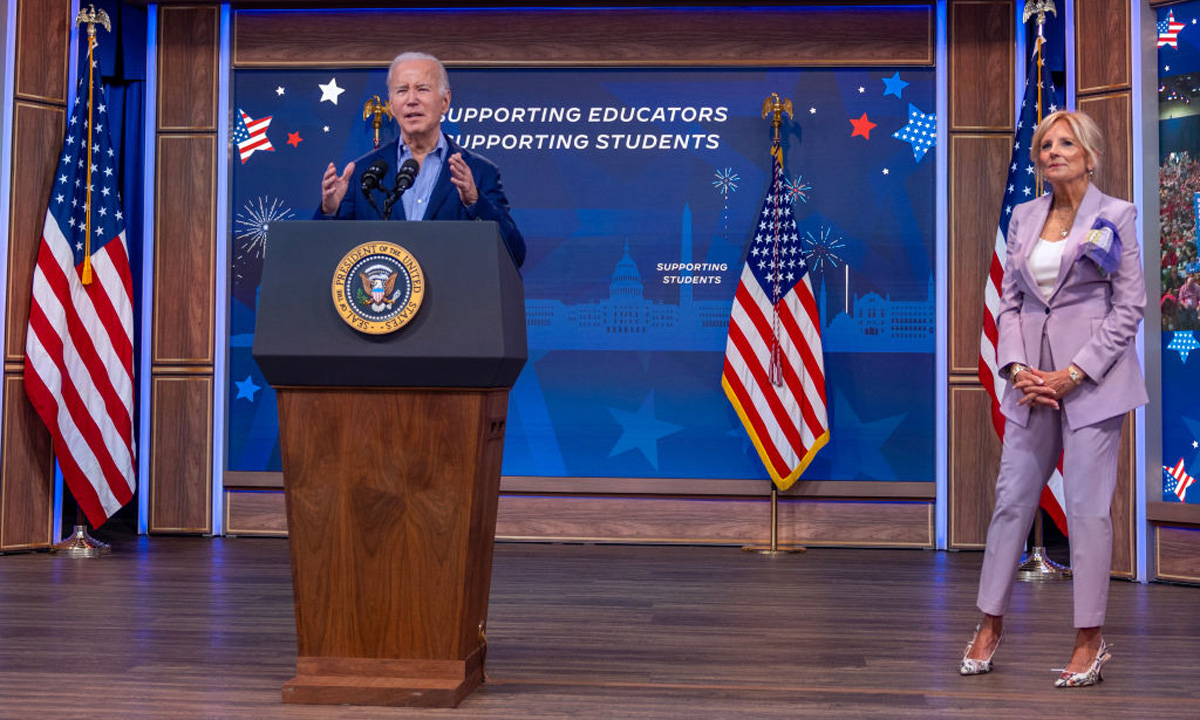At Its Annual Convention, NEA Didn’t Practice What It Preaches about Democracy
The union bills its representative assembly as “the world's largest democratic, deliberative body.” But just how democratic and deliberative is it?

Get stories like this delivered straight to your inbox. Sign up for The 74 Newsletter
The National Education Association held its representative assembly in Orlando, Florida, over the Independence Day holiday. The union chose to go ahead with the event despite its vehement opposition to the policies of Gov. Ron DeSantis and the state legislature. In her keynote address, NEA President Becky Pringle called Florida “our nation’s Ground Zero for shameful, racist, homophobic, misogynistic, xenophobic rhetoric and dangerous actions.”
NEA made that opposition the focal point of the gathering, joining a protest organized by Florida for All on July 1 and then staging its own rally outside the convention center July 5. Its themes were “Freedom to Learn” and “Teach Truth.”
“As this nation’s largest, most powerful union … we will protect our democracy [and] preserve public education,” said Pringle.
But the union’s commitment to these principles did not extend to its own operations during the convention. It stage-managed every aspect of the proceedings and saw to it that no shadows were cast across its self-image as the progressive defender of democracy.
NEA bills its representative assembly as “the world’s largest democratic, deliberative body.” But just how democratic and deliberative is it?
The delegates spent most of their time at the four-day convention introducing, debating and voting on “new business items.” These are proposals for the national union to take a specific and finite action. They are paid for through NEA’s contingency fund, which totals $3 million.
The NEA annual budget approaches $375 million, which means the delegates are devoting almost all of their attention to less than 1% of the union’s operations.
The delegates do vote on the total budget at the end of the convention, but they cannot add, amend or delete anything from it — only approve it or reject it as is.
Which new business items were approved and which were rejected? Neither the public nor the non-attending members of NEA have any idea. The union put the proposals and actions behind a firewall, and very few individual delegates saw fit to pass along the information.
Education Week — the only media outlet to cover the convention — reported that the delegates approved an item to support LGBTQ+ issues, at a cost of more than $580,000. New Business Item 69, which had something to do with religious expression, passed by 20 votes out of more than 4,500 cast.
New Business Item 53 proposed that NEA instruct local affiliates on how to become “strike-ready.” The delegates voted to refer it to committee, which upset the sponsor of the item, Deb Gesualdo, a delegate from Massachusetts, because she felt it left the decision to act or not in the hands of a few higher-ups, instead of the large representative body.
In a video she posted on TikTok, she claimed the “NEA board steering committee began to organize against it” and that her item “upset a handful of state presidents who are interested in hoarding information and hoarding power.”
Another delegate also sounded a bit disillusioned. “I sat with some teachers from different states at one point. What did we talk about? Our working conditions, our pay, our workload, student behavior … things that were not talked about during the [representative assembly]. Our [new business items] had little to do with teaching,” he posted on Twitter.
While the public, the press and most NEA members were in the dark about the proceedings, at least the delegates in attendance could witness them. But even delegates present at the assembly were mostly unaware of what actions NEA officials took just outside the hall.
NEA staffers represented by the Association of Field Service Employees have been working without a contract since June 1. In an attempt to move negotiations along, a group of them showed up at the convention center to hand out leaflets and hold signs.
This didn’t sit well with NEA executives, who, according to the association, sent convention center security and a sheriff’s deputy to have them removed from the premises.
The staff union also claims it was prevented from joining the Freedom to Learn rally, and that NEA urged delegates not to interact with the staff union.
“On a day when NEA professed the ‘freedom to learn,’ AFSE members and NEA members were denied their freedom of speech,” tweeted the staff union.
Its demands include the usual pay increases and benefit improvements, but the association also accuses NEA of increasing members’ workload while shrinking staff and relying on temporary employees, which it calls “an anti-union, exploitative practice.”
The association received strong support from its sister unions of NEA employees, the National Staff Organization and the National Education Association Staff Organization, which has its own gripes with NEA management.
The staff union placed a petition on ActionNetwork.org that accuses some NEA leaders of prejudice and racism. “At NEA Headquarters there is a persisting culture of mistreatment and disrespect of our Black staff that has continued to go unchallenged,” the post reads.
There are legitimate concerns about whitewashing history, covering up errors and misdeeds, and promoting only a positive, glowing image. NEA’s own actions during its representative assembly demonstrate the union is not immune from such urges.
Mike Antonucci’s Union Report appears most Wednesdays; see the full archive.
Get stories like these delivered straight to your inbox. Sign up for The 74 Newsletter

;)